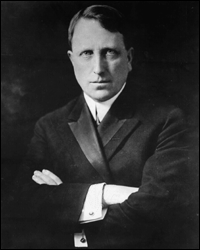William Randolph Hearst (1863-1951), dropped out of Harvard in his senior year and took control of one of his father’s business interests: the San Francisco Examiner. Eventually Hearst would go shopping for a paper in New York City, and purchased the New York Journal in 1895.
Turn of the century New York was a battlefield of newspapers warring over advertisements and circulation. To boost sales, Hearst started printing sensational stories, flashy comic strips, and cut the price of the paper to a penny.
The events leading up the Spanish-American War (1898) provided Hearst with ample material for an increase in circulation. The war hungry American public lapped up the articles posted in the Journal, which had reporters in Cuba who went out looking for (and making) news in order to give the Journal a further edge. Hearst is credited today of seemingly starting the war single handedly with issues like these, as well as making liberal use of Yellow Journalism. The American people at the time, however, were just as ready as the Journal to gallantly go to war.
Following the war, the Hearst empire continued to grow, and Hearst started to become political. He ran for Congress in 1903, having behind him not only the support of Tammany Hall but also his own papers. He won handily, serving two terms in office as a Democrat. Hearst, however, was unable to attain any other office, narrowly losing elections for both mayor of New York City, and governor of New York.
As time went on, however, the initially progressive Hearst became increasingly conservative. With the election of Franklin Delano Roosevelt, Hearst, who at first rejoiced at the prospect of a Roosevelt Administration, was taken aback by
the New Deal. Hearst, who at this time owned an extensive array of print publications and other sources of media, issued a succession of newsreels going after the president and his policies.
William Randolph Hearst is a textbook case of the power of the press. Through his dozens of news holdings, as well as his extensive syndication network, Hearst pushed forward his agenda on the American people. It is estimated that one in four American’s subscribed to a Hearst publication at the peak of his power, which was right before the Depression. Using this as a platform, Hearst extended his own agenda in regards to himself and his ideals. What a luxury that must’ve been.


Leave a response